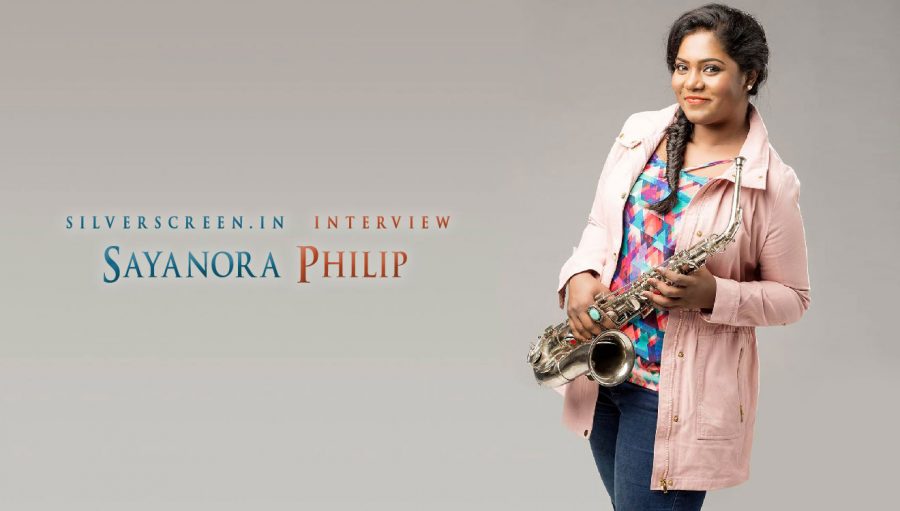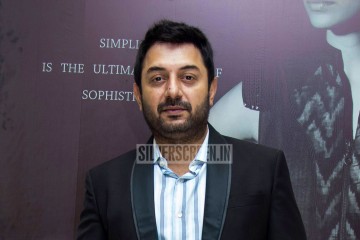In 2018, Sayanora Philip made two debuts. The singer turned music composer for rural drama Kuttanpillaiyude Sivarathri, becoming one of the few women in India to do that. For director Shyamaprasad’s slice-of-life Hey Jude, she dubbed for actor Trisha Krishnan. While she always knew composing music would be a part of her journey, the second instance rattled her a little.
She laughs from the other end of the phone over the memory of the dubbing sessions, her voice resembling a sunny day, in contrast to the heavy downpour outside. “I nailed the emotional scenes where she (Rachael, the character played by Trisha) loses her cool and screams at her father and friends. Everyone in the studio was happy. Then came the real challenge. I could just not do the romantic scenes. I was nervous, and blushing so much.” Finally, the team offered to turn down the lights in the studio and leave her alone so that she could dub in peace.
In a conversation with Silverscreen.in, the 34-year-old musician spoke about her career that spans over 14 years, her penchant for experimentation, and her association with the Women In Cinema Collective, the platform that brewed a storm in a patriarchal Malayalam film industry.
***
Kuttanpillaiyude Shivarathri, which unfolds in a lower middle-class Hindu joint family during a holy season, has a soundtrack built on traditional folk tunes. Chakka Paattu is designed on the lines of a Thottam Paattu, a form of folk music recited before Theyyam performances. Sayanora also wrote Ente Shivane, sung by actor Suraj Venjarammood who plays the lead role in the film.
Jean Markose, the film’s director, hadn’t told her until the last minute that he planned to rope her in to compose the music, says Sayanora. “I wasn’t nervous or diffident, I always knew it was possible. So, I decided to give it a try, to see if I had it in me,” she says. “You never know what you are capable of until you give it a try. And, I had a great team – talented musicians such as Job Kurian and my programmer Varkey – who helped me get over the hiccups.”
Before Sayanora, Malayalam cinema has had just two female music composers – Usha Khanna, who worked predominantly in Bollywood but composed music for a few Malayalam films such as Moodal Manju (1969) that features popular songs such as Nee Madhu Pakaru and Manasa Mani Veenayil; and playback singer and live performer Neha Nair, who turned music composer (along with Yakzan Gary Pareira) for 5 Sundarikal and Iyyobinte Pusthakam.
“While growing up, we all seek idols and role models. It is important to have such role models. When there are barely any women pursuing a career in the field of music direction, would it be easy for a little girl to consider it a career option?” asks Sayanora. “I, for one, have never looked at a male composer and thought I wanted to be like him. My father is an instrumentalist, yet it never occurred to me during my formative years that I could be an independent composer. And, people in the film industry, generally have an assumption that female artistes can’t be composers.”
A diligent performer and student of music since a young age, Sayanora says composing the songs was a cakewalk; it was the background that took time and effort. “You need to be careful about the nuances, getting the right notes to express the emotions of the scenes and the various characters. Before anything else, you need to have a sense of cinema. I wanted songs and the background score to be always in touch with the film. It’s like a landscape where everything – tunes, lyrics, vocals and instruments – should be within the context.”
She was born into the family of artistes. Her father encouraged her to take up serious study of music. “I don’t make plans and work according to them. Thanks to my father, I have a strong foundation in Carnatic music, Western vocals, tabla, keyboard and guitar. After college, I moved to Thiruvananthapuram to learn Hindustani music. Unlike the young me, Daddy always looked at music seriously. May be, he had a futuristic outlook,” she says. A post-graduate in Marine Biology, Sayanora once had to skip her university examination to attend a playback recording session, and her father was happy to back her decision.
Sayanora made her debut as playback singer in Vettam (2004). She was a sight to behold on television shows, where she sang Western numbers strumming a guitar and held her own against a society that was yet to get used to a mainstream female playback singer who could confidently sing and play a musical instrument. The big moment in her career came when she got to sing for AR Rahman – Athiradi, for Rajinikanth’s Sivaji (2007). She was also a part of the Oscar-winning composer’s team that toured the world and performed on stages across the world.
Put together the number of songs singers from the previous generation have sung in a year, and what Sayanora has managed to in 14 years, and the low numbers are revealing. Over the last decade, the number of female solos have come down significantly, a phenomenon Sayanora is trying to understand. “It’s definitely happening. There are fewer female singles than ever in Malayalam cinema. Perhaps, because there are fewer powerful female characters. When actresses such as Urvashi and Manju Warrier were at the peak of their careers, their films had female solos. That’s not the case now,” she says.
Malayalam commercial cinema has moved on from melodrama to a more realistic form, and melodious songs have, for the most part, been replaced by slick numbers that sound like an extension of the background score. Vocals are just one of the elements in these songs, as against the olden times when songs used to be led by and be known after the singer.
This change in scenario has a positive side, says Sayanora. “Now is the time of independent artistes. Those who have the talent and the spirit to experiment can showcase their work on online platforms – YouTube or social media, or perform on stage. The competition is huge, the number of artistes is huge, but the situation is better than before, because musicians are no longer dependent on the film industry,” she explains. The trick to sustain is to stop worrying about money, she says. “It is not easy. There won’t be a monthly pay cheque or regular opportunities. The struggle will be unending. Don’t venture to this field if you are not ready for the insecurities and uncertainties that come along with it. This is what I tell my cousins.”
Auto-tune software has, to a great extent, changed the way people perceive music, but it can never cover lack of talent, says Sayanora. “You can never make a robust career with the support of auto-tune. Unless you have musical talent, and know how to use technology to your advantage, listeners will find out sooner or later.”
Like in every field, change is inevitable in music too, she says. “Haven’t we become a society of impatient people? Earlier, people made genuine efforts to find and listen to good music. With the spurge in content, we started taking art for granted. Now, there are crash courses and shortcuts to learn a new art form or a discipline.” She tells me about her daughter Zena. “It is difficult to convince the young generation about the importance of rehearsals, practice sessions… Zena, for one, is reluctant to listen to a five-minute song in its totality; she asks to change the track. Recently, my friend Rajalakshmi (State-award winning singer) recorded with my daughter for a children’s music album. She made Zena rehearse the song many times; by the fifth time, she was bored.” Which is why, she says, it is important to take kids out of the world of smart phones and induct them into the old-school way of persistent training.
Sayanora continues to perform on stages across the world. It’s an adrenaline rush she doesn’t want to forego. “Not every stage is fun. I love spaces that reciprocate the energy I toss up to them. I want that vibe to know that the audience is enjoying my music.”
Her first attempt at dubbing was for a short film directed by her close friend Soumya Sadanandan. “One day, out the blue, she asked me if I would like to dub for a character. Rabbit Hole is about depression and how invisible it can be. The character is a stand-up comedian, so she took me to a performance. Around a week after that session, Shyam sir offered me a song in Hey Jude. While recording it, he asked me if I could dub for Trisha’s character. Such a coincidence, I thought. Now, I am waiting to take up more dubbing opportunities, she says.
***
Recommended
Sayanora is one of the founding members of the Women In Cinema Collective who met Kerala Chief Minister Pinarayi Vijayan in May 2017. “WCC was something that happened on the sidelines of what I was doing to support my best friend who was going through a bad phase,” she says. “There was no one from the film industry supporting her. When we, her close friends, realised how serious the situation was, we decided to stay close to her, support her in every possible way.”
The situation took a toll on Sayanora, and pinned her down. “I was depressed, and even considered leaving the film industry. Kuttanpillaiyude Sivarathri was a life-giver, in that sense. When a woman faces a horrendous crime, and the industry she is part of doesn’t stand by her, what hope remains? We all have tiny individual lives to be busy in. But, life is also about being humane. We have reduced to a society that doesn’t care about it any more. “



